Let’s be honest: the line between history and fiction doesn’t really exist. After all, history is just stories we tell ourselves. The way we tell those stories says more about our time than about the times we’re examining. Reading about decades- or even centuries-old events in contemporary sources and then comparing how we talk—or don’t talk—about them now is a sobering insight into how writing history shifts what happened into what we think happened and how we process it long after the fact.
So when we write fantasy using history as our playground, we aren’t really rewriting history. We’re writing our own questions played out on a historical background. Fortunately for us, history is cyclical, and we keep needing the same questions answered again and again and again.
The very best books use those legends and histories so seamlessly that, after reading, you feel like you know true things. And even if much of the history you are then driven to research turns out to be made up, that sense of truth captured by the writer doesn’t fade.
With that in mind, here are my five favorite books that use European history or historical legends as a background for asking timeless questions about life, love, and the reality of magic.
The Once and Future King by T. H. White
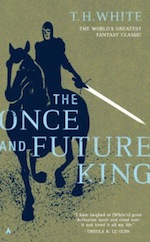 As the basis for this brilliant novel, White uses the legends of King Arthur and Camelot. What could have been merely a retelling becomes something so much larger as he uses those tales to explore kingdoms, wars, politics, love, loyalty, and the transient, unobtainable notion of goodness. As we follow Arthur from child to man to king, we grow with him and carry the weight of all that knowledge and all those choices, too. Though not the original, White’s Camelot (not a silly place at all) feels far truer than any other version.
As the basis for this brilliant novel, White uses the legends of King Arthur and Camelot. What could have been merely a retelling becomes something so much larger as he uses those tales to explore kingdoms, wars, politics, love, loyalty, and the transient, unobtainable notion of goodness. As we follow Arthur from child to man to king, we grow with him and carry the weight of all that knowledge and all those choices, too. Though not the original, White’s Camelot (not a silly place at all) feels far truer than any other version.
The Raven Cycle by Maggie Stiefvater
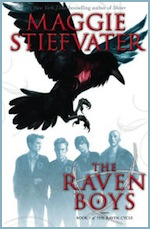 There was once a Welsh prince named Owain Glyndŵr. That much is true. Maggie Stiefvater is one of the greatest current YA writers. That much is also true. The rest—five friends, practical psychics, ley lines, dreams and nightmares coming to life, true love that is literally deadly, wealthy connoisseurs of wonder, and really awful cars described in loving detail—uses the myth of Glyndŵr waiting to be called back to tell a fantastic-but-true-feeling story of what it is to long for magic in a world that constantly tries to deny you. Stiefvater’s books will give you a little bit of that magic back.
There was once a Welsh prince named Owain Glyndŵr. That much is true. Maggie Stiefvater is one of the greatest current YA writers. That much is also true. The rest—five friends, practical psychics, ley lines, dreams and nightmares coming to life, true love that is literally deadly, wealthy connoisseurs of wonder, and really awful cars described in loving detail—uses the myth of Glyndŵr waiting to be called back to tell a fantastic-but-true-feeling story of what it is to long for magic in a world that constantly tries to deny you. Stiefvater’s books will give you a little bit of that magic back.
His Fair Assassin series by Robin LaFevers
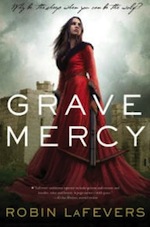 I’ll say it up-front: There wasn’t a secret island convent of assassin nuns (the bastard children of the God of Death) that got swept up in political intrigue in Medieval Brittany. More’s the pity, because assassin nuns. But LaFevers works her subtle fantasy elements so seamlessly into the tapestry of a real-life historical border war you can’t quite give up the hope that maybe—just maybe—LaFevers knows some things we don’t.
I’ll say it up-front: There wasn’t a secret island convent of assassin nuns (the bastard children of the God of Death) that got swept up in political intrigue in Medieval Brittany. More’s the pity, because assassin nuns. But LaFevers works her subtle fantasy elements so seamlessly into the tapestry of a real-life historical border war you can’t quite give up the hope that maybe—just maybe—LaFevers knows some things we don’t.
Jonathan Strange & Mr. Norrell by Susanna Clarke
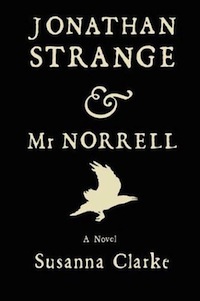 This massive tome is as charming as it is wordy. It’s hard to believe it wasn’t written during the Napoleonic Wars; Clarke’s imitation of the style of the time is a master class in voice. Her footnotes, referencing legends and histories that didn’t actually occur, are one of the highlights of a highlight-packed book. But her reimagining of an England that had actual magic in its past—and future—feels so plausible because of how much is rooted in the actual regional myths and legends of the British Isles. Stories have it that, back in the day, if you suspected your house was on a fairy path, you moved. That same sense of wonder and dread at the mysteries of magic permeates this one-of-a-kind, deeply British book.
This massive tome is as charming as it is wordy. It’s hard to believe it wasn’t written during the Napoleonic Wars; Clarke’s imitation of the style of the time is a master class in voice. Her footnotes, referencing legends and histories that didn’t actually occur, are one of the highlights of a highlight-packed book. But her reimagining of an England that had actual magic in its past—and future—feels so plausible because of how much is rooted in the actual regional myths and legends of the British Isles. Stories have it that, back in the day, if you suspected your house was on a fairy path, you moved. That same sense of wonder and dread at the mysteries of magic permeates this one-of-a-kind, deeply British book.
Outlander by Diana Gabaldon
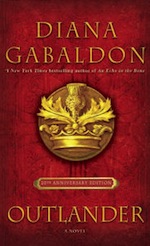 Come for the time travel, stay for the kilts. Gabaldon’s book is famously hard to categorize—is it fantasy? Sci-fi? Historical romance with a slightly magical twist? In the end, it doesn’t matter what it is, because what it isn’t is boring. Ever. Taking a plucky World War II nurse and throwing her back in time to Scotland during the Jacobite rebellion lets the reader discover this time and history right along with the intrepid heroine. (And if it, ahem, has rather more sexytimes than most history texts, well! As I said, the past isn’t dull in Gabaldon’s hands.) I’m guessing that, like me, most readers start out not knowing much about this period in Scottish history, and come away feeling like they lived it.
Come for the time travel, stay for the kilts. Gabaldon’s book is famously hard to categorize—is it fantasy? Sci-fi? Historical romance with a slightly magical twist? In the end, it doesn’t matter what it is, because what it isn’t is boring. Ever. Taking a plucky World War II nurse and throwing her back in time to Scotland during the Jacobite rebellion lets the reader discover this time and history right along with the intrepid heroine. (And if it, ahem, has rather more sexytimes than most history texts, well! As I said, the past isn’t dull in Gabaldon’s hands.) I’m guessing that, like me, most readers start out not knowing much about this period in Scottish history, and come away feeling like they lived it.
 Kiersten White is the New York Times bestselling author of the upcoming historical reimagining And I Darken, starring a gender-swapped Vlad the Impaler. Among her previous works are the Paranormalcy trilogy, the Mind Games series, Illusions of Fate, and In the Shadows with artist Jim Di Bartolo. Follow her on Twitter at @kierstenwhite.
Kiersten White is the New York Times bestselling author of the upcoming historical reimagining And I Darken, starring a gender-swapped Vlad the Impaler. Among her previous works are the Paranormalcy trilogy, the Mind Games series, Illusions of Fate, and In the Shadows with artist Jim Di Bartolo. Follow her on Twitter at @kierstenwhite.









